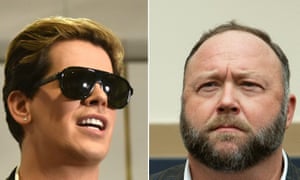Far-right Facebook groups 'spreading hate to millions in Europe'
Avaaz uncovers 500 accounts using fake news to spread white supremacy message
 People already barred from Facebook include the far-right activist Milo Yiannopoulos (L) and the conspiracy theorist Alex Jones. Photograph: Mark Graham/AFP/Getty Images
People already barred from Facebook include the far-right activist Milo Yiannopoulos (L) and the conspiracy theorist Alex Jones. Photograph: Mark Graham/AFP/Getty Images
A web of far-right Facebook accounts spreading fake news and hate speech to millions of people across Europe has been uncovered by the campaign group Avaaz.
Facebook, which is struggling to clean up the platform and salvage its reputation, has already taken down accounts with about 6 million followers before voting in the European elections begins on Thursday. It was still investigating hundreds of other accounts with an additional 26 million followers, Avaaz said.
In total, the group reported more than 500 suspect groups and Facebookpages operating across France, Germany, Italy, the UK, Poland and Spain. Most were either spreading fake news or using false pages and profiles to artificially boost the content of parties or sites they supported, in violation of Facebook’s rules.
The networks were far more popular than the official pages of far-right and anti-EU populist groups in those countries. The pages taken down by Facebook so far had been viewed half a billion times, Avaaz estimated.
“The pages [uncovered by Avaaz] have high levels of interactions. It doesn’t matter how many followers you have if there are no interactions,” said Christoph Schott, the groups’s campaign director. “They have over 500 million views just on the pages taken down, that’s more than the number of voters in the EU.”
However, while some had been taken down, including a large network in Spain also uncovered by Avaaz, many had not.
Activity ranged from French accounts sharing white supremacist content, to posts in Germany supporting Holocaust denial, and false pages promoting the Alternative für Deutschland party (AfD) party.
In Italy, tactics included setting up general interest pages for beauty, football, health or other interests, then after followers signed up, transforming them into political tools.
The researchers traced how a page, ostensibly set up for an association of agricultural breeders, slowly morphed into one supporting the far-right League, sharing a video that purported to show migrants smashing up a police car. It is actually a scene from a film and has been repeatedly debunked.
The pages were not just targeted at upcoming elections, Schott said, but aimed to change politics by giving a false impression of grassroots support for their content.
“We feel [these networks] have a significant impact, they run disinformation campaigns that go on for years, for example, making a specific issue seem more important.”
The investigation was carried out by independent investigators and journalists hired by Avaaz after an online funding drive. More than 47,000 people donated small sums, making the project financially independent.
Facebook had followed up on the investigation, but at no point did the Avaaz team work with the social media firm, it said. Instead, it handed over its findings for Facebook to verify and take action, and investigations were still under way.
“We think Facebook did a good job so far of acting, but should have done a better job of detecting these pages,” Schott said. “They should do this themselves. We are around 30 people, they have over 30,000 in their safety and security team.”
Geen opmerkingen:
Een reactie posten
Opmerking: Alleen leden van deze blog kunnen een reactie posten.